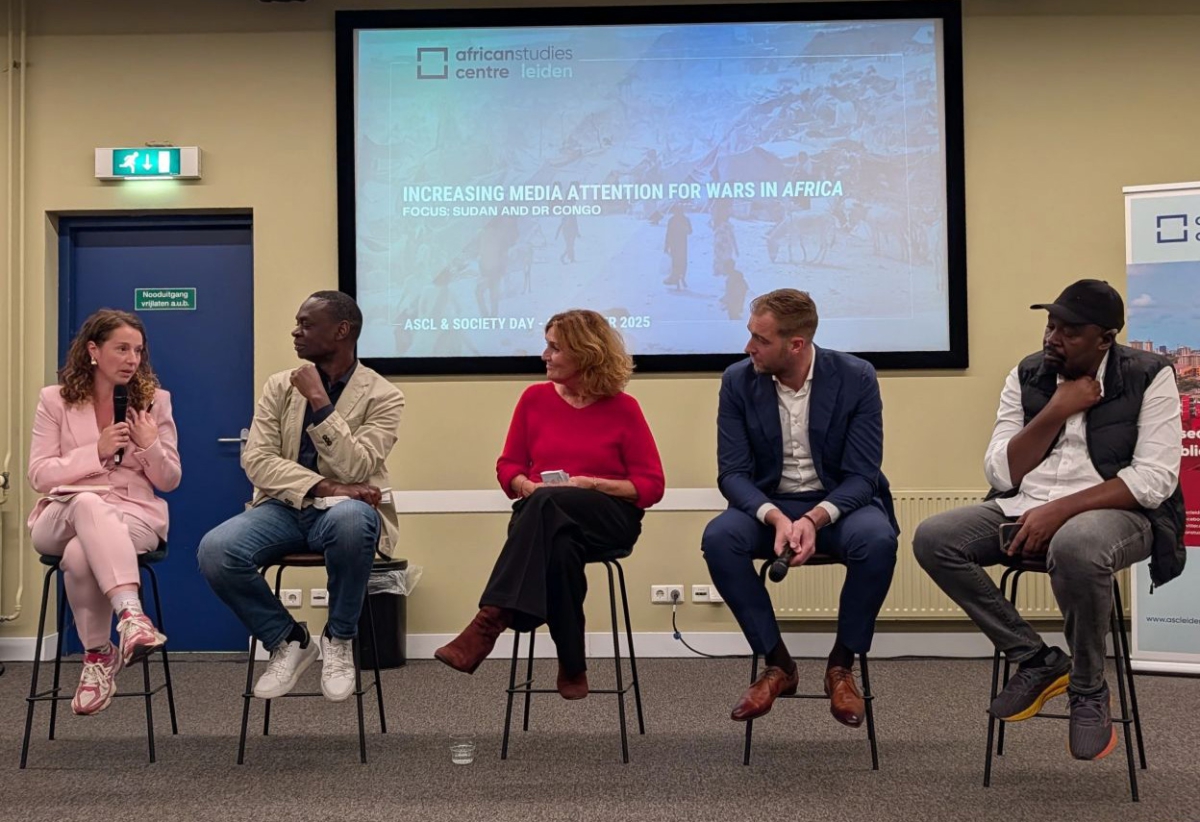Report on panel discussion: Increasing media attention for wars in Africa. Focus: Sudan and DRC

On 9 October, as part of its Societal Day, the ASCL organised a panel discussion on the coverage of wars in Africa, particularly the wars in Sudan and DRC, and the little attention they receive in the media. Some of the questions raised were: Why is this the case? What are the obstacles in reporting, and in what ways can media report? What roles do NGOs and academics play?
The expert panel consisted of Annegina Randewijk (investigative journalist/Africa editor, Nederlands Dagblad), Carlijne Vos (chief foreign editor, De Volkskrant), Alphonse Muambi (author, speaker on DRC), Bastiaan van Blokland (press officer, Netherlands Red Cross), and Rahmane Idrissa (senior researcher, African Studies Centre Leiden). It was an insightful, engaging discussion under the capable guidance of David Ehrhardt (associate professor, Faculty of Governance and Global Affairs). The audience, consisting of journalists, (PhD) students, researchers and NGO workers, eagerly participated, confirming that the topic is highly relevant and many people care about these often so-called ‘forgotten’ conflicts.
To mention some of the causes that came up:
- Lack of connection to Dutch audiences. For example, the war in Ukraine would be more in their proximity (within Europe’s borders). According to a journalistic rule, geographical proximity and emotional proximity are correlated. This was quickly contested by the argument that in today’s globalised world, everything is connected. One can’t talk about DR Congo without talking about the minerals that we all use in our electronic devices, cars, etc. Making this clear would increase readers’ interests in these conflicts.
- This could be linked to the need for systemic changes that were called for: decolonisation and humanisation of media reporting. Media narratives are shaped by national and regional context and perception. To make African wars visible is not just to report on them, but to rethink how we value certain lives and stories over others.
- Some media would regard these conflicts as too complicated, a lot of contextualising would be needed, making articles too long for today’s readers (short attention span). ‘Nobody would be interested’, a young, starting journalist had been told.
- Non-mainstream media more easily find their way to broader audiences, but sometimes lack credibility and funding for in-depth investigative journalism to counter mis- and disinformation.
- Worries exist about the power of media owners in the Netherlands and Belgium, and their interests. While most participants felt there is freedom of press in The Netherlands, this is something that should be monitored and protected.
- The difficulty/impossibility to gain access to the conflict areas, due to safety reasons, fighting parties’ restrictions, and extremely high costs. This could be (and is already partly) overcome by using open-source intelligence (OSINT), public sources, and satellite imagery, that demonstrate the legitimacy of claims about events.
- NGOs have the experience that crises gain people’s interest if they are shown images of these crises. With two-third of the Sudanese journalists having fled the country, and many injured or even killed, this situation makes it extremely difficult to access journalistic sources from within. However, via the diaspora it is possible to gather people’s stories, as it is by looking for personal stories and testimonies on social media – however, there is the risk of unreliability there. Also, NGOs still work in certain areas and work together with local sources to show what is happening.
- Journalists could tap more into the research that is done by universities and make use of researchers’ expertise. More trust-building between academics and journalists appears to be useful.
- Everyday stories about Africa are necessary to take away the war-torn image that still clings to the entire continent. Yes, report on the wars, but complement these reports with stories on the so many other things that are happening in African countries; treat it like any other continent.

